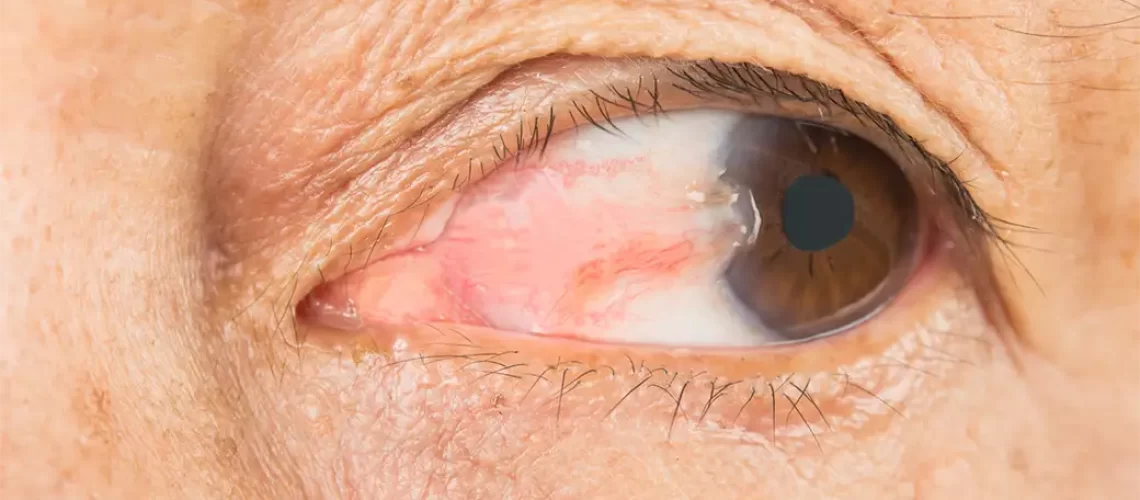Pterygium – a common affliction of summer sun
More than 250,000 Aussies are at risk of an ultraviolet (UV) radiation-induced eye disorder this summer as the holiday season gives rise to people spending prolonged periods in the sun.
Eye doctors are warning sun seekers to ensure their eyes are adequately protected when outdoors to avoid an overgrowth on the eye’s surface, known as a pterygium, which can cause redness and discomfort, and, in some cases if left untreated, can lead to vision disruption and the need for eye surgery.
According to Sydney ophthalmologist, Professor Stephanie Watson OAM, up to one in a hundred Australians willdevelop a pterygium – which can affect one or both eyes – at some stage in their lives, with the risk of an increase in size with ongoing sun exposure.
“Pterygium, commonly known as surfer’s eye, is noticeable as a triangular-shaped, blood-vessel-filled growth from either corner of the eye, but usually from the nose, in towards the pupil.
“While many Australians may be aware that sun damage can lead to skin cancer around the eyes or may increase the risk of cataracts and possibly macular degeneration, not everyone may be aware of the risk for pterygium from UV radiation,” Prof Watson said.
“Pterygium typically affects adults and is more common as we get older. Anyone enjoying the summer sun these holidays may be at risk of either developing pterygium for the first time or exacerbating the growth of small pterygia from earlier years that may have previously gone unnoticed.”
Blurred vision and irritation can become common as a pterygium grows, with the most common symptoms to lookout for including red or irritated eyes. Other symptoms may include dry or watery eyes, with some people experiencing itching or burning sensations, or the feeling of constant grit in the eye.
“Pterygium can stop growing, increase slowly over the years or in some people they can grow quite rapidly,” said Prof Watson.
“The key concern is if a pterygium does continue to grow it can lead to vision problems.
“Vision may become increasingly blurry or partially blocked in the affected eye. Importantly, if a pterygium causesdistortion or scarring of the cornea – which covers the coloured part of the eye and the pupil – this may lead to astigmatism in the first instance or permanent vision loss in the later,” Prof Watson said.
“Along with regular sun exposure and chronic eye irritation, the sun, wind and sand together, may increase the risk of developing a pterygium.”
Aside from recreational outdoor UV exposure, Prof Watson adds outdoor occupational UV exposure may contribute to the development of pterygia.
Treatment for mild cases includes the use of eye-drops such as lubricating eye-ointments to reduce irritation, steroids to reduce inflammation, and, in more serious cases, surgery to prevent the pterygium from growing over the cornea.
“The best way to protect your eyes this summer from UV light is by wearing wrap-around sunglasses with good UVprotection, wide-brimmed hats, and when possible, to use umbrellas and sun tents when outdoors for extended periods of time,” Prof Watson said.
“Taking note of your eye health should be high on your summer priorities, to not only prevent conditions such as pterygium, but also skin cancer around the eyes and other forms of eye damage.”
People concerned they may have already developed a pterygium should visit their GP, optometrist, or an eye specialist for a complete assessment and action plan.
About SMS Healthcare
SMS Healthcare is a private healthcare provider focusing on facilitating and streamlining patient care through multidisciplinary teams, short-stay hospitals and integration of healthcare services. The company has a national footprint and comprises primary care, diagnostic care, specialist care, day surgery and short-stay hospitals across multiple healthcare disciplines. SMS Healthcare focuses on achieving operational efficiencies and streamlining the delivery of healthcare to support connected patient care.



